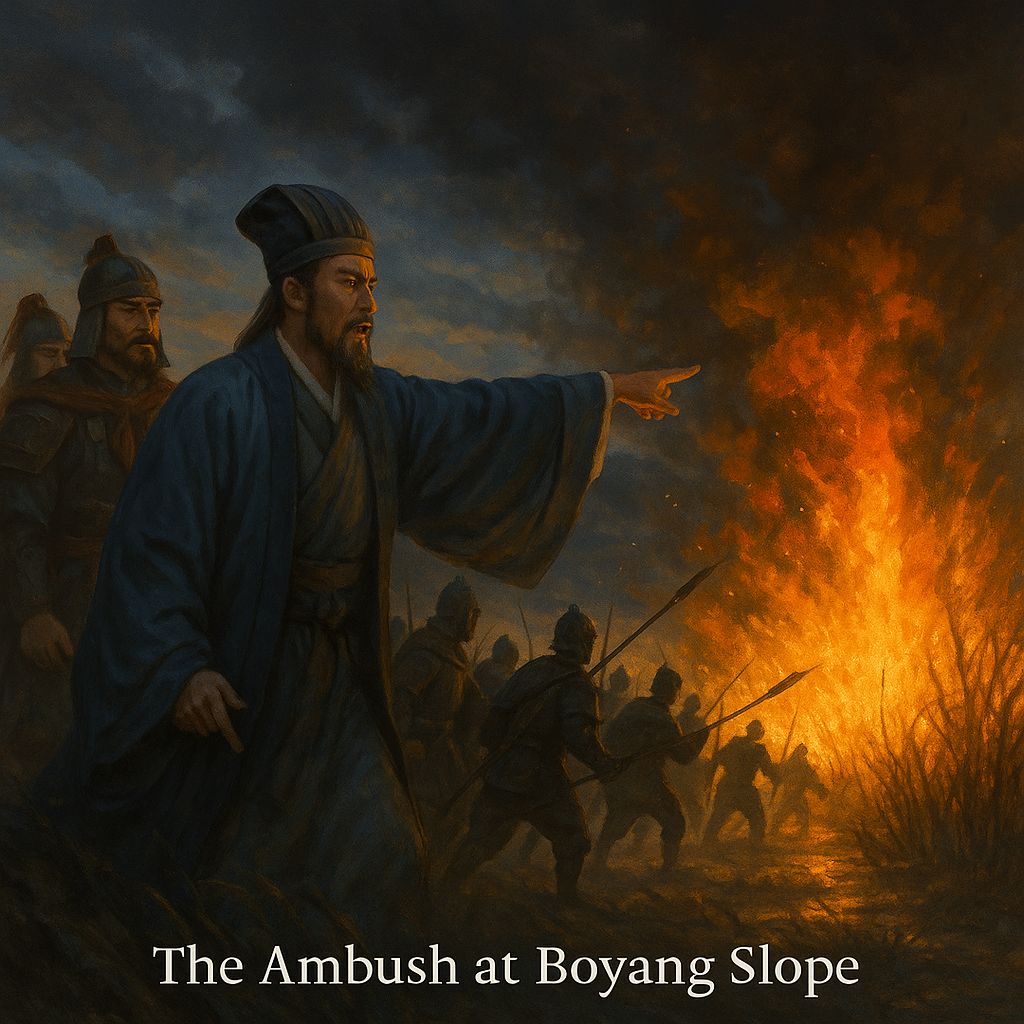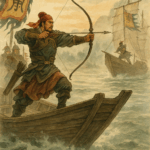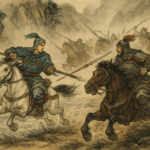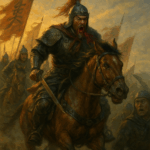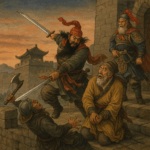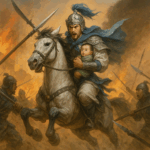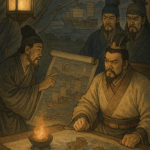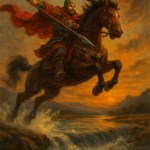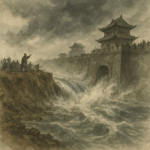Sun Quan marshaled his forces and attacked Xiakou. Huang Zu’s army was routed and he fled, knowing he could no longer hold the city. He abandoned Jiangxia and made for Jing Province. Anticipating this, Gan Ning lay in ambush outside the East Gate. When Huang Zu—escorted by only a few dozen riders—broke through the gate, Gan Ning blocked his path. From his horse Huang Zu called out, “I have never treated you lightly—why do you press me now?” Gan Ning retorted, “When I served at Jiangxia I won many merits, yet you treated me like a river pirate! What excuse have you now?” Realizing escape was impossible, Huang Zu wheeled his horse to flee. Gan Ning charged through the enemy and pursued; soon more shouts rang out behind him as several riders—led by Cheng Pu—came up. Fearing a contest for glory, Ning hastily notched an arrow and shot Huang Zu from his horse. He cut off Huang Zu’s head, joined forces with Cheng Pu, and returned to present the trophy to Sun Quan. The Prince ordered that the head be placed in a wooden casket to be offered before his late father’s spirit. He richly rewarded the army and promoted Gan Ning to commandant, then debated how best to garrison Jiangxia. Zhang Zhao counseled, “A single, isolated city cannot hold. Better to return to Jiangdong and prepare. Liu Biao will surely seek revenge once he learns of Huang Zu’s death; we can wait in safety, defeat him, and then strike at Jing.” Sun Quan agreed, abandoned Jiangxia, and withdrew to Jiangdong.
Meanwhile, Su Fei, locked in a caged carriage, secretly messaged Gan Ning for aid. “Even if Fei says nothing,” replied Ning, “I have not forgotten him.” When Sun Quan’s army reached Wuchang, the Prince ordered Su Fei’s cage opened and had him stand alongside Huang Zu’s head at the ancestral altar. Gan Ning knelt before Sun Quan in tears: “If Fei had perished, how could I have served you? Though he merits death, I beg you pardon him and restore his rank.” Sun Quan answered, “Because he once served you loyally, I will spare him. If he deserts, what then?” “He owes you his life and would never flee,” said Ning. Thus Su Fei was pardoned, and only Huang Zu’s head was offered. After the rites, they feasted and celebrated.
In mid–banquet, a guest rose, sword in hand, and rushed Gan Ning. Sun Quan recognized him as Ling Tong, whose father, Ling Cao, had been killed by Ning at Jiangxia. He sprang up to hold his sword. “General Ling,” said the Prince, “you and Ning now fight under one banner—how can you still nurse old grudges? Leave vengeance to me.” But Ling Tong, red–eyed, cried, “A blood feud cannot be forgotten!” Only after repeated pleas did he sheath his blade. That day, Sun Quan appointed Gan Ning to garrison Xiakou with five thousand troops and a hundred warships to keep Ling Tong’s anger in check, while granting Ling Tong the title “Commandant for Valor.” From then on, Eastern Wu built more ships, stationed soldiers along the riverbanks, placed Sun Jing to guard Wuchang, and encamped the Prince himself at Chaisang. Zhou Yu spent each day training the navy on Poyang Lake, preparing for further campaigns.
Meanwhile, Liu Bei sent scouts to Jiangdong, who reported, “Wu has slain Huang Zu and now holds camp at Chaisang.” He summoned Zhuge Liang to plan their next move. Before they could speak further, envoys from Liu Biao arrived, inviting Liu Bei to Jingzhou to discuss vengeance. Zhuge Liang observed, “They surely seek counsel after Wu’s victory. I will accompany Your Excellency and craft our strategy.” Liu Bei agreed, leaving Guan Yu to hold Xinye and sending Zhang Fei with five hundred men to Jingzhou. On the road, Liu Bei asked Zhuge Liang how to respond if Jingzhou’s officers pressed him to attack Wu. The Master replied, “First thank them for their kindness. If they propose an expedition east, politely decline and ask leave to return to Xinye to regroup.” Passed on to Jingzhou, Liu Bei and Zhuge Liang lodged at the official inn, quartering Zhang Fei’s men outside. They then paid respects to Liu Biao. After formal greetings, Liu Bei apologized before the throne. Biao said, “I know how you were wronged. I wished to behead Cai Mao in your honor, but was held back by my ministers. Please forgive him—I will not punish him.” Liu Bei replied, “That matter lies with his subordinates, not the General.” Biao continued, “Now that Jiangxia is lost and Huang Zu dead, let us discuss revenge.” Liu Bei answered, “Huang Zu’s cruelty brought his ruin. But if we march south and Cao Cao moves north, what will we do then?” Biao said, “I am old and ill; I cannot manage affairs. Won’t you help me rule Jingzhou? After I die, the province will be yours.” Liu Bei hesitated. Zhuge Liang exchanged a glance with him, and Liu Bei said, “Allow me some time to consider.” They withdrew.
Back at the inn, Zhuge Liang asked, “Why decline Jingzhou’s offer?” Liu Bei replied, “They showed me kindness—how can I seize their city in their hour of need?” Zhuge Liang sighed, “Truly a benevolent lord!” As they discussed this, news came that Liu Qi, Biao’s son, awaited Liu Bei’s help at his residence. Liu Bei entered and found Qi weeping, “My stepmother will kill me before long—please save me.” Liu Bei answered, “That is family business, not statecraft.” Zhuge Liang smiled. Liu Bei whispered to Qi, “Tomorrow I shall send Master Kongming to advise you. Listen well.” Qi thanked him.
The next day, claiming a stomachache, Liu Bei sent Zhuge Liang to visit Qi. The Master rode to Qi’s house, was shown into the back hall, and after tea Qi implored him, “Please help me.” Zhuge Liang replied, “I dare not meddle in family affairs—it could bring greater harm.” Qi insisted, and when the Master rose to leave, Qi hurried after him, begging, “Why depart without a word?” Zhuge Liang sat again. Qi then begged him to see an old book, luring him upstairs. There, he seized the stairway and declared, “I must have your counsel, or I will die.” He drew his sword. Zhuge Liang, angered, rose to descend but found no stairs. Qi pleaded, “I trapped you to hear your advice.” The Master at last relented: “Have you not heard of Shensheng and Chong’er? One remained at home and perished; the other fled and survived. Now that Huang Zu is gone and Jiangxia is ill–defended, petition to hold it and you will escape death.” Relieved, Qi released him and sent a ladder to lower him. Zhuge Liang returned and reported to Liu Bei, who rejoiced.
At dawn Liu Qi petitioned Liu Biao to garrison Jiangxia. Biao hesitated, so Liu Bei said, “Jiangxia is critical—it must be held by your own lord. I will defend the northwest; the southeast is yours.” Biao warned that Cao Cao was training a river fleet in Ye—surely he would invade south—and Liu Bei assured him he was prepared. Biao then appointed Liu Qi with three thousand troops to hold Jiangxia.
Meanwhile in the north, Cao Cao had resigned his three ministerial offices, taking the title of Imperial Chancellor for himself. He appointed Mao Jie and Cui Yan as secretaries, and Sima Yi to the literary bureau. With his civil administration in place, he turned to his generals to plan a southern campaign. Xiahou Dun volunteered: “I hear Liu Bei at Xinye is drilling troops daily—he could become a menace. We should act now.” Cao Cao made Xiahou Dun commander, with Yu Jin, Li Dian, Xiahou Lan, and Han Hao as deputies, a force of a hundred thousand to march on Boyang, eyeing Xinye. Xun Yu cautioned, “Now that Liu Bei has Zhuge Liang as his strategist, do not underestimate him.” Xiahou Dun replied, “He is no more than a rat—how fearsome can he be? I will capture Liu Bei and Zhuge Liang, or offer my head to you!” Xu Shu added, “Please do not belittle Liu Xuande. With Zhuge Liang’s guidance, he is a tiger with wings.” When Cao Cao asked who Zhuge Liang was, Xu Shu said: “His courtesy name is Kongming, the Recluse of the Crouching Dragon. He commands heaven and earth in his schemes—he is a genius of our age, not to be slighted.” Cao Cao nodded gravely, and Xiahou Dun set out.
Back at Xinye, Liu Bei treated Zhuge Liang as his teacher, much to Guan Yu and Zhang Fei’s impatience: “He’s so young—what skill can he have?” they grumbled. Liu Bei replied, “He is like water to a fish—stop your talk.” One morning a messenger delivered an ox’s tail as a hat ornament. Zhuge Liang entered, frowning: “Do you have any grand ambition, or merely this?” Liu Bei laughed and tossed down the ornament: “I use it to forget my worries.” Zhuge Liang then asked how they would contend with Cao Cao. Liu Bei confessed he had no plan. “Quickly recruit local militia,” said the Master. “I will train them.” Thus, Liu Bei raised three thousand new soldiers from Xinye, and Zhuge Liang drilled them in tactics day and night.
Meanwhile Xiahou Dun approached Boyang with a hundred thousand troops escorting supply wagons. Autumn winds rose as they marched. Spying dust ahead, he formed his ranks and inquired of a guide: “Where are we?” “Before you lies Boyang, behind lies the Luo River ford.” Dun ordered Yu Jin and Li Dian to hold camp while he advanced. He laughed and told his officers, “Xu Yu praised Zhuge Liang as a heavenly genius—but look, he sends mere supply wagons to face me, as if sending sheep to fight tigers! You shall see I was right to boast I’d capture Liu Bei and Zhuge Liang.” Ignoring Han Hao’s warning that Zhao Yun might lure them into an ambush, Dun pressed on.
At dusk they reached the slopes of Boyang. A signal cannon fired. Liu Bei led his troops in a fierce charge, prompting Dun to cry out, “What force is this?” The battle raged as Cao Cao’s lines faltered. Soon Dun’s wagons were burning and fire spread through the reed marshes. His men panicked, trampling one another; many perished in the blaze. Zhao Yun returned and pressed the advantage. Dun escaped through smoke to Boyang, but Yu Jin and Li Dian were forced back by Zhang Fei’s ambush. Xiahou Lan and Han Hao came to rescue the supplies but met Zhang Fei and fell back. By dawn the Wu forces called off the pursuit. The carnage was so great that rivers ran red with blood. A later poem celebrated:
“Boyang’s stratagem by fire employed,
Triumph won with laughter amid the flames.
Cao Cao’s courage crumbled at the sight,
First glory to the Master of the Crouching Dragon.”
Xiahou Dun rallied his survivors and returned to Xuchang.
Zhuge Liang then gathered his officers. Guan Yu and Zhang Fei exclaimed, “Truly a great hero!” A few miles down the road they met Mi Zhu and Mi Fang escorting a small carriage. Inside sat Zhuge Liang. Guan and Zhang dismounted to salute him. Soon Liu Bei, Zhao Yun, Liu Feng, and Guan Ping arrived and they distributed the captured supplies and rewards before returning to Xinye. The townspeople thronged the roads, bowing: “Thanks to our lord and his worthy adviser, we survive today!” Back in county, Zhuge Liang told Liu Bei, “Though Dun was beaten off, Cao Cao will surely send his main army.” “What then?” asked Liu Bei. “I have another stratagem,” replied the Master. Thus, the next chapter would unfold his plan:
“After victory’s smoke, still no time to rest—
To elude the foe, one needs yet deeper cunning.”
